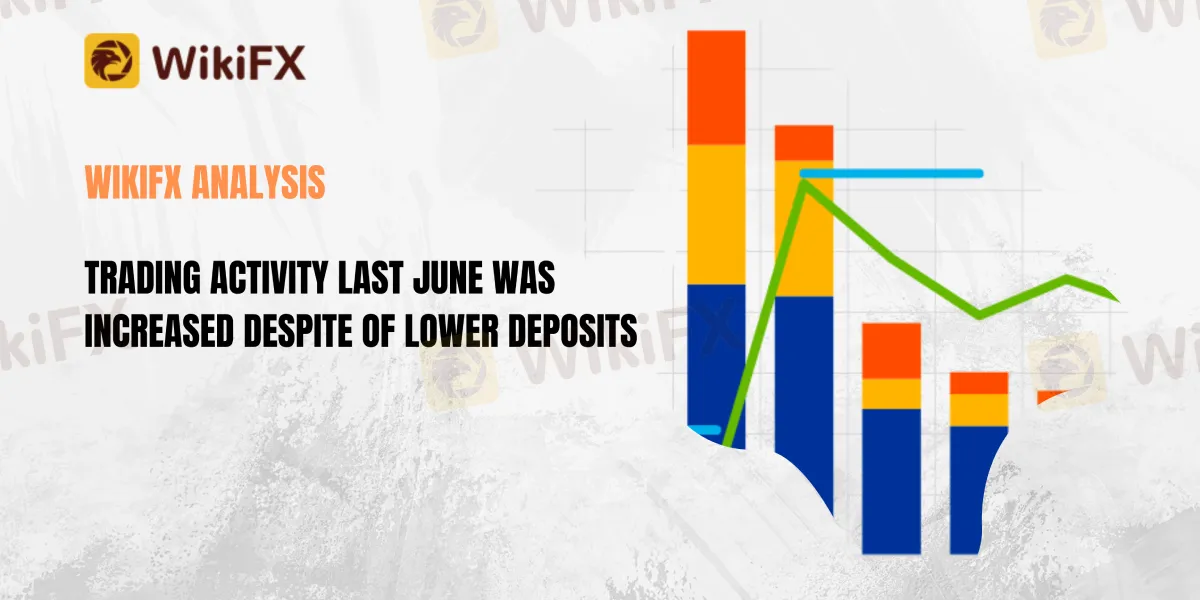简体中文
繁體中文
English
Pусский
日本語
ภาษาไทย
Tiếng Việt
Bahasa Indonesia
Español
हिन्दी
Filippiiniläinen
Français
Deutsch
Português
Türkçe
한국어
العربية
WikiFX Analysis: Trading Activity Last June Was Increased Despite Of Lower Deposits
Abstract:According to the most recent trend data studied by WikiFX, retail investors elected not to deposit extra funds in their accounts in June. Nonetheless, they performed more transactions than the prior month.

Retail dealers put in less money.
The average transaction volume rose.
We witnessed an increase in the size of deposits in May. The overall average monthly deposit increased to $14,630, setting a new record in our records for total deposits. This trend did not continue long, as the average value of the total monthly deposit fell to $11,504 in June, the lowest level since September 2021.
The average total monthly withdrawals decreased in June as well. While the overall average monthly deposit increased to $8,146 from $5,221 in May, it fell to $7,507 in June, the second-lowest level this year.
Retail investors made more trades.
Despite fewer capital inflows and outflows, retail traders continued to trade, although on a lesser scale. The average number of transactions done by one trader increased to 296.5 in June, up from 285.1 the previous month. In addition to approaching the 300 transaction mark, the amount has climbed significantly over the same period last year. The average number of transactions in July 2021 was 224.
What was noteworthy was that Kuwait topped the activity rankings for the second month in a row. This country's merchants were followed by Turkish traders. China, which is normally the most active, came in fourth this time with 304 deals per dealer.
In the next months, this will be examined for industrial activity. Stay tuned for further industry-related studies, or contact us personally if you have any questions.
About WikiFX
Wikifx is a platform for searching worldwide company financial information. Its primary duty is to search for basic information, regulatory licenses, credit assessment, platform identification, and other services for the participating foreign currency trading firms.

Wikifx has created a big data solution that unifies data gathering, data screening, data aggregation, data modeling, and data productization using public data from government agencies, sophisticated sniffer systems, and scientific computer algorithms. Wikifx may then assess the supervision and risk levels of the associated organizations across several dimensions and give matching security solutions to individual users, corporate users, and government agencies.
Stay tuned for the latest forex market news.
Download the WikiFX App from the App Store or Google Play Store.

Disclaimer:
The views in this article only represent the author's personal views, and do not constitute investment advice on this platform. This platform does not guarantee the accuracy, completeness and timeliness of the information in the article, and will not be liable for any loss caused by the use of or reliance on the information in the article.
Read more

The Daily Habits of a Profitable Trader
Every professional trader follows a structured approach to ensure they are well-prepared, disciplined, and able to seize opportunities with confidence. Whether you are a seasoned investor or an aspiring trader, adhering to a robust daily checklist can significantly enhance your performance. Use this checklist to check if you are a qualified trader

The Impact of Interest Rate Decisions on the Forex Market
Interest rate changes determine currency attractiveness, influencing capital flows and exchange rate trends. Understanding this mechanism helps investors navigate the forex market effectively.

How a Housewife Lost RM288,235 in a Facebook Investment Scam
A 47-year-old housewife in Malaysia recently fell victim to an online investment scam, losing a substantial sum of RM288,235 after engaging with a fraudulent scheme advertised on Facebook.

A Trader’s Worst Mistake: Overlooking Broker Reviews Could Cost You Everything
In today’s digital age, reviews influence nearly every decision we make. When purchasing a smartphone, television, or home appliance, we pore over customer feedback and expert opinions to ensure we’re making the right choice. So why is it that, when it comes to choosing an online broker where real money and financial security are at stake many traders neglect the crucial step of reading reviews?
WikiFX Broker
Latest News
The Withdrawal Trap: How Scam Brokers Lure Victims into Paying More
FCA to Investors: Think Twice Before Trusting These Brokers
Trump\s tariffs: How could they affect the UK and your money
Trump gambles it all on global tariffs he\s wanted for decades
TradingView Brings Live Market Charts to Telegram Users with New Mini App
Trump tariffs: How will India navigate a world on the brink of a trade war?
Interactive Brokers Launches Forecast Contracts in Canada for Market Predictions
Authorities Alert: MAS Impersonation Scam Hits Singapore
IG Group Acquires Freetrade for £160M to Expand UK Investment Market
U.S. March ISM Manufacturing PMI Released
Currency Calculator







